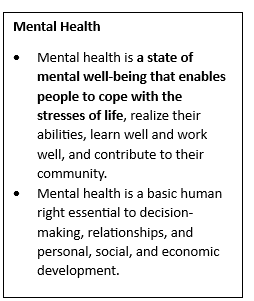Syllabus:
GS2: Issues relating to development and management of Social Sector/Services relating to Health, Education, Human Resources.
Context:
Recently, the Supreme Court issued a set of guidelines for educational institutes to protect the mental health of students in high-pressure academic environments.
More on the News
- These guidelines will be applicable to coaching centre and private educational institutes.
- India faced a legal and regulatory gap in preventing student suicides, despite its constitutional and global commitments.
- To address this, the Supreme Court invoked Article 141 to issue binding guidelines, requiring all educational institutions with 100+ students to implement stronger mental health safeguards.
- These guidelines will act as an interim protective architecture and, as such, assist the National Task Force in developing a more comprehensive and inclusive framework.
- Mental Health is an integral component of the right to life under Article 21 of the Constitution.
- The Mental Healthcare Act of 2017 reinforces the constitutional mandate by recognising every person’s right to access mental healthcare and protection from inhuman or degrading treatment in mental health settings.
Key Guidelines

- The guidelines require all educational institutes to appoint or engage at least one qualified counsellor and refrain from engaging in batch segregation based on academic performance, public shaming, or assignment of academic targets disproportionate to student capacity.
- All residential-based institutions must install tamper-proof ceiling fans or equivalent safety devices, restrict student access to rooftops, balconies, and other high-risk areas and prevent possible suicide attempts.
- All educational institutions shall ensure optimal student-to-counsellor ratios.
- Educational institutes should establish a dedicated counselling room and create clear protocols for periodic and on-demand counselling of students. Additionally, the institutes must prominently display helpline numbers and mental health support contacts in classrooms, hostels, washrooms, and common areas.
- Additionally, the institutes must prominently display helpline numbers and mental health support contacts in classrooms, hostels, washrooms, and common areas.
- The court directed regular sensitisation sessions for parents, teachers, and non-teaching staff to identify early signs of stress or suicidal ideation among students.
- The judgment strictly prohibited public shaming or singling out students for poor performance or behaviour.
- Institutes must set up internal grievance committees and conduct yearly mental health audits of students, preferably by external experts.
- The Court directed institutes to document preventive measures and report all suicide cases or attempts to district authorities.
- All teaching and non-teaching staff shall undergo mandatory training at least twice a year, conducted by certified mental health professionals, on psychological first aid, identification of warning signs, response to self-harm, and referral mechanisms.
- All educational institutions shall prioritise extracurricular activities, including sports, arts, and personality development initiatives.
- Examination patterns shall be periodically reviewed to reduce academic burden and to cultivate a broader sense of identity among students beyond test scores and ranks.

